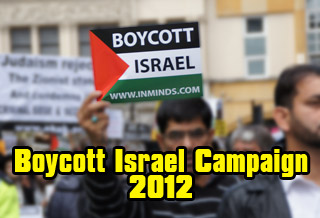
 Innovative Minds © 2014. All Rights Reserved. www.inminds.co.uk | ||||
Children's author faces Jewish wrathFiachra Gibbons, arts correspondent, The Guardian Tale of boy's life in West Bank prompts pressure groups to call for withdrawal Jewish pressure groups are calling on a publisher to withdraw a children's book about a Palestinian boy growing up amid the intifada on the West Bank. 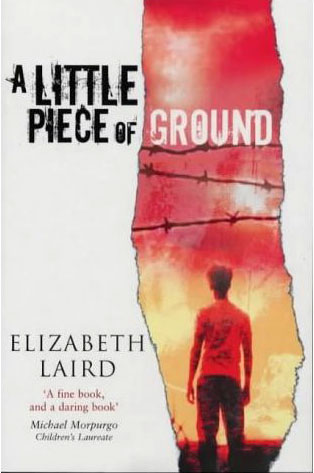 A Little Piece of Ground by Elizabeth Laird (UK Edition) A Little Piece of Ground, by the multi-award-winning author Elizabeth Laird, is a fictional account of how a 12-year-old called Karim - whose family's olive groves have been confiscated by settlers - copes when his father is stripped and humiliated by Israeli troops. As the boy is swept up in the protest against the occupation, and his friends make a fake bomb, he dreams of developing an "acid formula to dissolves the steel in Israeli tanks". Macmillan has received three demands for the book to be pulped, and many bookshops are worried about stocking it, lest it provoke further protests from Jewish groups. So far, most of the attacks on Laird have come from North America, led by a chain of Canadian bookshops which made the first "vitriolic" complaint to her publisher. It is understood that others have come from Jewish pressure groups. The New Zealand-born novelist wrote her book after visiting Ramallah as part of a British Council scheme to encourage writing for children. She denies the story is anti-Israeli. "I did expect comeback, but to say that any criticism of Israel is anti-semitic is doing Israel a disservice. This is an important story that should be told. It shows a child under military occupation. It's terrible for the occupiers, and terrible for the occupied. I hope I have shown how awful it is for the soldiers too," said Laird, who has lived in Beirut and Iraq.
I did expect comeback, but to say that any criticism of Israel is anti-semitic is doing Israel a disservice. This is an important story that should be told. It shows a child under military occupation...
Elizabeth Laird "There is already a great deal of understanding of Israel. All western people have felt sympathetic to Israel, for good reason often; and I don't think that should stop. The voice of the Palestinian child, on the other hand, has not been heard." Children's writer Ann Jungman, a member of the liberal Jews for Justice in Palestine group, said that she admired the book but still found it biased. "It's not what is in there that I object to. It's what has been left out. There should have been a broader picture. All the Palestinians are reasonable, and all the Israelis are monsters." Laird, who has won the Children's Book Award, the Smarties Prize and been nominated three times for the Carnegie Medal, claimed A Little Piece of Ground was not meant to explain politics. "It's true, lots of Israelis are trying to come to an accommodation with the Palestinians, and many refuse to serve in the West Bank. But the book is written through the eyes of a 12-year-old who just sees men with guns. It would not have been true to my characters to do otherwise. "The book is not so much about politics as about brothers, friendship, falling in love and football." The title comes from a scrap of waste land that Karim and his friends turn into a football pitch and which later becomes a flashpoint in the violence.
Read it, and we know what it is to feel oppressed, to feel fear every day. And we should know it, and our children should know it, for this is how much of the world lives.
Michael Morpurgo, Children's Laureate, Laird insisted that everything in the book was drawn from real events. "A lot of the incidents have come from the main Israeli human rights website", while others were taken from the experiences of her collaborator, Sonia Nimir, a lecturer at Bir Zeit university on the West Bank. Laird said she "toned down" several parts of the book, but that the motivation for suicide bombing had to be tackled. "Suicide bombings are going on in the background, and in one scene I have Karim's uncle questioning his [Karim's] hunger for vengeance after his father is humiliated by the soldiers. He tells him: 'Does that make it right for us to go and bomb them?'" Britain's children's laureate, Michael Morpurgo, has defended the novel. "Sometimes we need more than escapism. No one but Elizabeth Laird could have written this book. She has lived in the Middle East. She knows it, loves it, grieves for it, and hopes for it." He urged parents to encourage their 11- to 14-year-olds to buy it. "Read it, and we know what it is to feel oppressed, to feel fear every day. And we should know it, and our children should know it, for this is how much of the world lives," he said. Macmillan refused to discuss where the demands to pull the book had come from, but Kate Wilson, managing director of its children's arm, said the firm had no intention of withdrawing it. "We thought long and hard about whether it was responsible to go ahead. We were aware it might provoke a range of opinions." She said Macmillan was not afraid of enraging Jewish opinion: "I do not think there is a powerful Jewish lobby in this country. Elizabeth is a remarkable writer, with an amazing ability to get under the skin of her characters - we see the perspective of the soldiers as well as Karim's." Ms Wilson maintained that the book directly confronted Karim's support for suicide bombers. "Its central theme in many ways is his clash with his uncle, who opposes them." Extract from A Little Piece of GroundKarim has watched his father being dragged from the family car and stripped at an Israeli checkpoint... He [the young Israeli soldier] is terrified, Karim thought, with surprise. He thinks we're going to attack him. He could almost smell the soldier's fear. "She didn't mean any harm," he said, hating the placating note he could hear in his own voice. "I'll take her back to the car." The soldier shoved at him roughly. "Take her. If there's any more trouble from you, you go over there and join the other terrorists." Karim scooped Sireen up in his arms and ran back to the car with her. Lamia had half opened the door, but another soldier was alongside the car now, ordering her to shut it. Karim handed Sireen to her and jumped into the back seat. "Oh, my darling," sobbed Lamia, her face in Sireen's hair. Karim was trembling violently. He felt sick with the backwash of fear. Farah moved across and leaned against him, her thumb firmly in her mouth. Her other hand clutching at his arm. This time, he didn't push her away. I hate them. I hate them. I hate them, he thought, unable now to look at his father, who still stood, reduced to an object of ridicule, beside the bewildered old man. Source: http://www.guardian.co.uk/international/story/0,3604,1028034,00.html Letter of support from Anti-Apartheid authorBeverley Naidoo, We should thank Liz Laird for her courage in writing a novel while knowing that she was bound to faces charges of bias (Children's author faces Jewish wrath, August 23). There are many excellent novels that encourage us to understand the horrors of the Holocaust through the eyes of Jewish children. A Little Piece of Ground is the first British novel that lets us fully enter the world of a 12-year-old Palestinian under occupation. If someone can dispute the credibility of the author's imagination and say that her character would not perceive the world in the way he does, that is legitimate critique. A novel has to stand or fall as literature and, in my judgment, this is a fine work. Beverley Naidoo Beverley Naidoo is an award winning childrens author, who through her words and actions fought the apartheid regime in South Africa. Due to her resistance to apartheid, at aged 21 she was imprisoned - in solitary confinment for 8 weeks. Later her books were banned, she gave half of the royalties from her book "Journey to Jo'burg" to the British Defence and Aid Fund for Southern Africa, that was helping the families of political prisoners.
Football, Twelve-Year-Old Boys, and Military Curfews: A Review of Elizabeth Laird's A Little Piece of GroundRon Jacobs www.dissidentvoice.org
If most Americans knew the circumstances of the Israeli occupation, they would not support it. Nor would they support their tax dollars going towards a project that depends on the daily humiliation and destruction of a people, their land and culture.. they would demand a change in Washington's policies in the Middle East. It is because this knowledge would precipitate such a change that it is repressed. Perhaps fiction is a better means of making these facts known.
Most twelve year-old boys in the United States spend their days thinking about video games, sports, school work, and maybe that cute girl in homeroom. If their father is a store owner, chances are they have no other concerns, since money is not a problem. In Elizabeth Laird's novel A Little Piece of Ground (Haymarket Books, 2006), the twelve-year-old boys that serve as the story's protagonists also spend a lot of their time on the aforementioned concerns. However, they also live in Palestine under occupation. This fact alone makes their concerns considerably different than boys in the US and other western countries. Whether they want to or not, Karim, Jodi and Hopper have to live with the knowledge that the soldiers who affect every aspect of their public lives consider them the enemy. The story begins with Karim dreaming about being a superstar soccer player and also being shed of the annoyances of his younger sister and older brother. The reader meets his family and best friend, the pampered and pleasant Jodi. Meanwhile, the Israeli Defense Forces are enforcing a curfew with tanks and bullets. His school is destroyed and, as he wanders the town during the few hours Palestinians are allowed out of their houses, Karim meets Hopper, a mischievous school mate whose family recently moved out of the refugee camp. After discovering the school soccer field is no longer usable thanks to the Israeli military action, Hopper leads Karim to a vacant lot near the camps -- where Karim is forbidden to go. The two began to kick the ball around and, after it bounces awkwardly away from them a couple times, they decide to turn the lot into a soccer field and begin to clear away the stones. Now, there are places in the US where boys this age are met with suspicion by the authorities and even threatened by their presence. However, there is no place yet that I know of where twelve year olds are considered fair game to be shot and arrested besides Palestine, Iraq and perhaps a few other locales. This may seem like old news to the adult reader, but even they can not help but be affected by the emotionally powerful story of Karim's realization of this truth. In addition, only the reader of the same mindset of the most hardened Israeli expansionist or without a heart would cheer the demeaning and deadly actions of Tel Aviv's military forces as they destroy lives and dreams in the city of Ramallah where most of the story takes place. 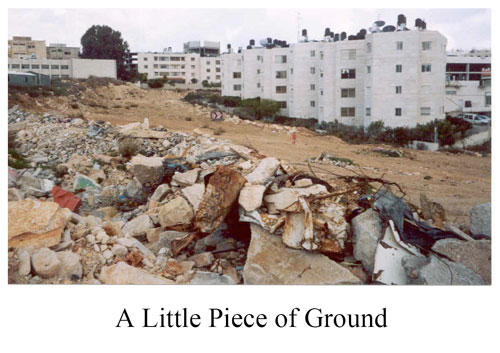 The title A Little Piece of Ground is about more than the makeshift soccer field the boys create. It's a metaphor for the plight of the Palestinians.. The title A Little Piece of Ground is about more than the makeshift soccer field the boys create. It's a metaphor for the plight of the Palestinians and millions of other people around the earth. These are the people who have no place to call their own, thanks to the greed and fears of those who control not only the land the landless live on, but their daily lives, as well. As the boys build their soccer field, study, and try to avoid the harsh reality around them, they also face issues of class as Karim and Jodi begin to understand the lives of their countrymen living in the refugee camps.
This book is an odyssey about youth becoming aware of injustice and domination.
Whether they know it or not, most US residents are not provided with a view of Palestinians and Arabs that emphasizes their humanity. Because of this, the general perception of the Palestinian people does not include the fact that they are, generally speaking, a family-centered society that emphasizes what politicians in the US call "family values." It is this aspect of Laird's tale that recommends this book to adults, as well as teenagers. As has been said before, if most Americans knew the circumstances of the Israeli occupation, they would not support it. Nor would they support their tax dollars going towards a project that depends on the daily humiliation and destruction of a people, their land and culture. If they knew that their tax dollars were being used not only to dehumanize the people under occupation, but also the soldiers involved in the carrying out the acts of humiliation and murder, they would demand a change in Washington's policies in the Middle East. It is because this knowledge would precipitate such a change that it is repressed. Perhaps fiction is a better means of making these facts known. Ms. Laird certainly gives it her best in A Little Piece of Ground. This book is an odyssey about youth becoming aware of injustice and domination. Anybody who can remember the first glimmerings of political awareness will appreciate the finely styled story Laird tells in these pages as she relates the emotions and reactions of the three boys personal and political growth. Any young person who reads this might well wish their lives were as exciting as those told in this book. Then again, maybe they'll look around and discover that there is something they can do -- about the situation of the Palestinians or someone even closer to their home. If I were a middle or high school teacher, I would definitely place this book on my students' reading list. Of course, the censors might not agree. Ron Jacobs is an avid reader. He is also the author of A History of the Weather Underground. His first novel, Short Order Frame Up, should be out in early 2007.
Ramallah novel in the firing lineAnne Johnstone and Phil Miller, One of the world's biggest publishers is being lobbied to withdraw a new children's book in which a young Palestinian dreams of killing Israeli soldiers.
[On the question of publishing the book] We discussed it long and hard. There's a huge Jewish lobby and also the question of censorship and responsibility within the context of children's books. For perhaps the first time it gives a 12-year-old the possibility of experiencing life as a Palestinian. Who am I to say: 'This is an experience you can't have'?
Kate Wilson, the managing director of Macmillan Children's Books A Little Piece Of Ground by Elizabeth Laird, was launched at the Edinburgh International Book Festival by its publishers Macmillan. It focuses on the fictional story of Karim, a 12-year-old living in the West Bank town of Ramallah. Among Karim's ambitions in the book - which is aimed at 10 to 13-year-olds - is to grow up to be the inventor of "an acid formula to dissolve steel in Israeli tanks". Ann Jungman, the children's author and a member of the Jews for Justice in Palestine lobby group, has called it a "very biased book" and Kate Wilson, the managing director of Macmillan Children's Books, admitted the company had received three demands to withdraw the book. She declined to identify the complainants but it is understood that one is a chain of Canadian book shops, whose tone of complaint was described by one source as"vitriolic". Ms Laird, a New Zealander of Scottish descent, said at the festival, which is sponsored by The Herald and Sunday Herald, that she felt impelled to write the book to convey some of the appalling conditions she found in Ramallah, after a visit last year to conduct workshops on writing for children. In the book, the hero watches his father being stripped and humiliated by Israeli soldiers, the family's olive farm taken over by Jewish settlers and the local school destroyed by Israeli tanks. The title of the book refers to the scrap of derelict land where Karim and his friends attempt to carve out a football pitch.
Every western child reads the Diary of Anne Frank and other authors who give a very sympathetic view of Israel and I am not denigrating that, but somehow the Palestinian story has been forgotten..
Elizabeth Laird, author, Ms Laird remains unrepentant about the book. She said her critics were confusing fears of anti-semitism with the valid questioning of the current Israeli administration. "Every western child reads the Diary of Anne Frank and other authors who give a very sympathetic view of Israel and I am not denigrating that, but somehow the Palestinian story has been forgotten," she said. She added: "I know I'll be accused of beating a drum but I'd just like my critics to read the book before they condemn it." However, Ms Jungman said of the book: "All the Palestinians are reasonable and all the Israelis are monsters. "It's not what's in there that I object to. It's what has been left out. There should have been a broader picture that shows how the Israelis have been manoeuvred into a bad situation as well." Sonia Benster, the owner of a renowned Children's Bookshop, and a respected commentator on children's books, said: "We're selling it because we're not censors, but I am very wary of it. I think it needs a sense of balance. "I was waiting for an exposition of suicide bombers or something that would show some understanding of the Israeli perspective. "Children of this age believe what they read. They will view the hero's enemy as their enemy and, at the moment, I cannot think of a book I could recommend to schools that would put the other side." Ms Laird, who collaborated with Dr Sonia Nimr, a lecturer at Bir Zeit University in Palestine, on the book, has traditionally championed the underdog in her books. She won the Children's Book Award for her novel Kiss the Dust, which features Kurdish refugees. She said that she had even "toned down" several parts of the book out of consideration for the age of her readership. On the question of publishing the book, Ms Wilson said: "We discussed it long and hard. There's a huge Jewish lobby and also the question of censorship and responsibility within the context of children's books. "For perhaps the first time it gives a 12-year-old the possibility of experiencing life as a Palestinian. Who am I to say: 'This is an experience you can't have'?" Its stance has been supported by Rosemary Stones, editor of the children's book magazine Books for Keeps, who said:"It's a terribly important voice that has not been heard because in most Middle Eastern countries there hasn't been the tradition of writing for children that we have in the West." An author's life
Source: http://www.theherald.co.uk/news/archive/22-8-19103-0-25-5.html Palestinian Kids and 'A Little Piece of Ground'Day to Day, National Public Radio(NPR) NPR's Madeleiene Brand reports on the children's book A Little Piece of Ground by Elizabeth Laird, and why the book's depiction of the life for Palestinian children is causing controversy.
ALEX CHADWICK, host: A children's book, not yet published in the US, is already controversial. The author's a British writer named Elizabeth Laird. She's written several other children's books that critics liked, most with themes of social or political injustice. This new book tells the story of a group of young Palestinian boys living in the occupied territories. DAY TO DAY's Madeleine Brand reports. MADELEINE BRAND reporting: "A Little Piece of Ground" is about three 12-year-old Palestinian boys. Ms. ELIZABETH LAIRD (Author, "A Little Piece of Ground"): And like ordinary boys everywhere, they have their own personal obsessions. And the main obsession that they have is playing soccer, and they want to find a place to play soccer. BRAND: `A little piece of ground.' That's the author, Elizabeth Laird. She says it's a metaphor for the Palestinian hope for their own piece of ground. Laird writes for the young adult market, children who would read the "Harry Potter" books by another British author, J.K. Rowling. But unlike Rowling's books, Laird's are about real life, set in the present day. She's written about Kurdish children fleeing Iraqi oppression and about homeless Ethiopian kids living on the streets. She says she felt compelled to write "A Little Piece of Ground" after she visited Ramallah. Ms. LAIRD: I was profoundly shocked by what I found, by the real dreadfulness of people's everyday life, the increasing poverty, the harassment, the curfews. And it occurred to me then that it would be a proper subject for a novel to see how children are managing under these circumstances. BRAND: So she lived with a Palestinian family to gather material for her book. 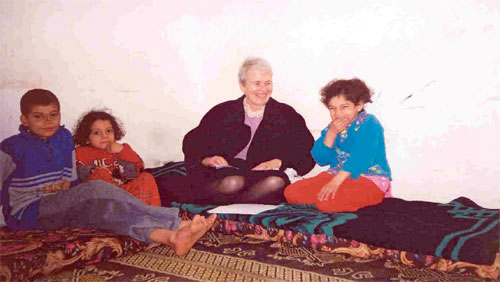 Elizabeth Laird in Gaza Ms. LAIRD: The task of the novelist is to be true to the story. And what I've tried to do in my book is to be as true as possible to what it is like to be a Palestinian child today. BRAND: But what is truthful depends on which side of the Green Line you're standing on. For Linda Silver, a children's book critic for Jewish Book World here in the US, Laird has been anything but truthful. Ms. LINDA SILVER (Children's Book Critic, Jewish Book World): It's as though the Israelis were invaders from outer space who are simply motivated by malicious desire to make people's lives miserable. They're just mindless killing machines. BRAND: One of the passages in the book that has Linda Silver so angry is where Israeli soldiers pull over a Palestinian family. They order the father to get out of the car and line up with other men for a strip search. Twelve-year-old Karim watches with his mother and young sister in the car. Unidentified Man: (Reading) `There was a burning pain inside him. He'd never thought much about his father before. He'd always assumed that his father knew best, that his decisions were right, that he could protect his family. All those sure things shifted in his mind as he saw his father's humiliation. Hot, red anger pulsed behind his eyes. `He came to with a start at the sound of a click. Serene(ph) had wriggled off Lamia's(ph) lap and was back in the driver's seat. She had opened the door and was jumping out onto the road. "No!" shouted Karim. "Serene, come back!" Without stopping to think, he opened his own door and ran to pick her up. He heard a shout, and before he could reach her, was pulled up short by a soldier grabbing his arm. "What are you doing, Palestinian?" the soldier snarled at him. "My sister," babbled Karim, "she's only four. She opened the door herself. I"--Serene had run back and grabbed hold of his leg. With the other hand, she pulled at the soldier's gray-green uniform trousers. "Please, Uncle," she said, "I want my babba(ph)." `The young soldier looked down at her as if he didn't understand. He hesitated, seemingly disconcerted at the touch of the little girl's hand. Karim could feel that the soldier's fingers still gripping his arm were shaking. "He's terrified," he thought with surprise. "He thinks we're going to attack him." He could almost smell the soldier's fear. "She didn't mean any harm," he said, hating the placating note he could hear in his own voice. "I'll take her back to the car." The soldier shoved at him roughly. "Take her. If there's any more trouble from you, you go over there and join the other terrorists." Karim scooped Serene up in his arms and ran back to the car with her. `Karim was trembling violently. He felt sick with the backwash of fear. "I hate them. I hate them. I hate them," he thought, unable now to look at his father who still stood, reduced to an object of ridicule beside the bewildered old man.' BRAND: A reading of "A Little Piece of Ground," the children's book that some critics say is an unfair depiction of the Israeli-Palestinian conflict. The owner of Canada's largest bookstore says she won't sell the book because she's so offended. In a letter to the publisher, Phyllis Simon said she was disgusted at the irresponsible decision to publish what she feels is a racist, inflammatory and totally one-sided piece of propaganda, and she's called on Macmillan to reconsider publishing it. Simon refused to comment for this story, but her views are echoed by children's book reviewer Linda Silver. Silver says author's of children's books have a particular responsibility to portray multiple sides of a sensitive political situation because children don't have the same critical faculties as adults. Ms. SILVER: It is, at the least, dishonest to portray a political conflict in totally unpolitical terms, particularly when it's written for kids who can't be assumed to know what the political context is. The author in that case has some responsibility, I think, to supply some, and she doesn't. Ms. LAIRD: Well, I think this is an interesting criticism. I wrote a book called "Kiss the Dust," and it's about a Kurdish family who escape from Iraqi Kurdistan and are interned in an Iranian refugee camp under very harsh conditions. Nobody has ever said to me that I should have shown the point of view of the Iranian guards in that camp. I would very much have liked to have put in that story a sympathetic Israeli character and, indeed, I tried to see how that could be done. But there's no point in making a sentimental attempt to show a half-truth when the whole truth is there in front of me. BRAND: The publisher is standing firmly behind Elizabeth Laird's book, saying it is just one of many stories to be told about the Israeli-Palestinian conflict. Macmillan will try to sell "A Little Piece of Ground" to publishers worldwide next week at the Frankfurt Book Fair. In the past, Laird's book have been snapped up by American publishers, but Macmillan acknowledges that this time it's not at all certain what will happen. For DAY TO DAY, I'm Madeleine Brand in New York. Source: http://www.npr.org/programs/day/transcripts/2003/sep/030930.brand.html 'A Little Piece of Ground'' is Emblematic of Palestine and a Matter of Shame for IsraelGenevieve Cora Fraser, Ramallah Online Columnist, Book Review 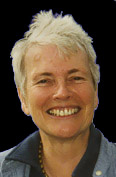 Elizabeth Laird I can see why the full weight of Zionist propaganda and intimidation tactics were leveled against Elizabeth Lairdâs childrenâs masterpiece, âA Little Piece of Ground,â targeted at an 11- 14 year-old readership. Truth can be painful, especially when it unmasks the real terrorist activity in Palestine, the state sponsored reign of terror orchestrated by the Israel Defense Force against families in the West Bank and Gaza Strip. âA Little Piece of Groundâ is a beautifully written but intensely painful book. In todayâs world most preteens and teens are saturated with televised news and entertainment featuring violence and arch-villains. Lairdâs book is careful in describing conditions in Palestine, without targeting any religious group or ethnicity as the culprit. But what kids may need help with as they work through the multi-layered drama is placing blame where it belongs, on the politics and policies of Israel, not the world-wide Jewish community. At heart, this is a gentle book that takes you into the inner life of the Aboudi family as seen through the eyes of the 12 year old Karim, a boy desperate to stretch his legs and play football and struggling to cope with his love-sick older brother and annoying younger sisters. âThere is no place to play properly,â he comlains because the Israeli tanks have trashed the local school and playing field as well as areas throughout his home town of Ramallah. And there is so little time to play, or get groceries for that matter. The life of a typical Palestinian family is a life lived under curfew, where families are forced into nearly unbearable hardship, trapped in an apartment for days and weeks at a time, where stepping outside for a breath of fresh air may result in a bullet to the head. 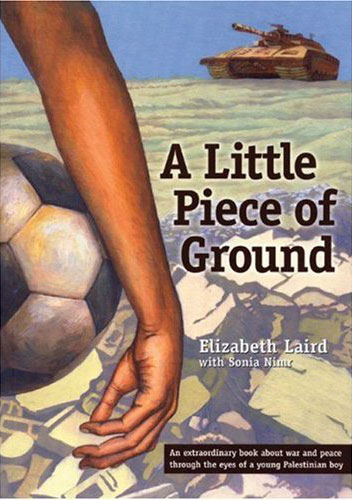 American Edition of "A Little Piece Of Ground" The book also takes you on a journey into Ramallah during moments when the city is free to breathe before residents are locked up once again like criminals in holding cells. Karimâs father is a merchant from a well-to-do village farming family. What should be a happy family week-end in the country becomes a nightmarish journey due to illegal settlement activities in the country side. At an impromptu checkpoint, Karimâs father is forced out of the car and made to strip at gunpoint. He is joined in the humiliation by other men out for a family ride and a village elder in long flowing robes. Later at the farm, the act of harvesting olives nearly ends in the execution of the family by Israeli settlers who have decided that what has belonged to the Aboudi family for generations now belongs to them. As the action progresses, Karim is befriended by a classmate who has grown up in a refugee camp and is determined to retake a bulldozed lot to make a proper place to play football, and to create a secret den as an after school hide-out. The effort to retake âa little piece of groundâ brings them face to face with Israeli tanks and soldiers and a near fatal adventure that takes the reader into the heart of the Israeli/Palestinian conflict. In addition to being a book about the youth of Palestine, âA Little Piece of Groundâ has a message for the Palestinian people suffering under a 37-year-long brutal occupation, the longest in modern history. Before returning from the village to Ramallah, Karimâs father, Hassan Aboudi sat silent at the family meal, but then âstraightened his back and looked round the table. âEndurance,â he said. âThatâs what takes courage. Decency among ourselves. Thatâs where we must be strong. When they steal from us and try to humiliate us, the real shame is on themselves.ââ Published in August 2003, âA Little Piece of Groundâ was written with the assistance of the Palestinian author Sonia Nimr and published by Macmillan Childrenâs Books, ISBN 0330436791. Cost UK £8.99 CDN $18.99. Discount prices are available. Note: I was unable to purchase âA Little Piece of Groundâ through Amazon.com in the United States, perhaps due to pressure from you-know-who, but was able to do so through their United Kingdom store. The book also appears to be available through the Amazon Canada site and may be purchased through your local bookstore by using the ISBN number (I hope, unless you-know-who has gotten to them too). Source: http://archive.ramallahonline.com/modules.php?name=News&file=article&sid=1841
A Response To The Campaign To Suppress The Publication And Distribution Of "A Little Piece Of Ground"Mordecai Briemberg, 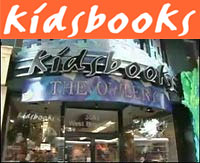 Kidsbooks has campaigned aggressively to silence the voice of a Palestinian child Picket KidsbooksNovember 29, 2003. Canpalnet members distributed leaflets to people going into Kidsbooks today.This was to counter the efforts of one of the owners of Kidsbooks to silence the voice of a Palestinian child, as conveyed in Elizabeth Laird's book âA Little Piece of Groundâ (see leaflet). After half an hour, we were told to stop or the police would be called. We calmly continued. And then the surprise: from nowhere visible three copies of âA Little Piece of Ground" suddenly appeared on display at the entrance to the store. This was a victory! We continued to leaflet so people would know the story of the failed campaign to suppress âA Little Piece of Landâ. But Kidsbook staff, challenged by customers about their actions, pretended they never had tried to block sales of the book (see our backgrounder and judge for yourself). Energetic and direct challenge to the campaigns for silencing the voice of Palestinian children (and adults) can be successful. So we must expand and continue our efforts. It is particularly appropriate to have a victory on November 29, the day the United Nations declared as the International Day of Solidarity with the Palestinian People.
If the child is Kurdish, their experiences, their visions of the injustices in their world, are fit to be described by Elizabeth Laird, and published and distributed and read ⦠and Phyllis Simon will display them in her store, Kidsbooks (Vancouver), advertised as the largest children's bookstore in Canada. But if the child is Palestinian, their experiences of living today under Israeli occupation, their visions of the injustices in their world, are not fit to be described by Elizabeth Laird, says Phyllis Simon of Vancouver Kidsbooks. And should Laird dare to do so, they are unfit for publication and distribution by Macmillan Children's Books. And should they dare to do so, other children are unfit to read them ⦠so says Phyllis Simon, and so you will not find âA Little Piece of Groundâ in Kidsbooks. Phyllis Simon has campaigned aggressively for the suppression of âA Little Piece of Groundâ. The incidents in the story, as the author Elizabeth Laird explains, are based on reports of real events by the main Israeli human rights organization. How does Phyllis Simon arrive at the conclusion that some children do not merit a public voice? I think it is because this Palestinian child's voice so profoundly challenges Ms. Simon's political loyalties to Israeli state actions that she is incapable of any other response to that child than ⦠âShut Up!â Her fear of that child's telling of their experiences is so deep that she is not even capable of a fair reading of the text. Following is the letter Phyllis Simon wrote to Macmillan publishers in her effort to have the book suppressed. The letter was posted by a relative of Phyllis Simon, with her permission, on the Hasafran website âThe Electronic Discussion Forum of the Association of Jewish Librariesâ: Dear Ms. Price: I am the co-owner of Canada's largest and most successful children's bookstore called Kidsbooks. Part of what has made us thrive is our commitment to promoting excellence in literature, and in bringing to our customers attentions books they might not otherwise encounter. During twenty years of business I have actively promoted many Macmillan titles, including those written by Elizabeth Laird. In fact, in my opinion her recent book The Garbage King is an outstanding novel that I have presented at several teachers events as one of the best books of the year. However, when the HB Fenn representative showed me the advance flyer for A Little Piece of Ground written by Elizabeth Laird in conjunction with a Palestinian writer, alarm bells sounded in my head almost immediately. Why was I concerned? I worried that the book might be decidedly one-sided, given the author collaboration and the hype in the flyer (Macmillan's decision to rush publication, the endorsement by Children's Laureate Michael Morpurgo, and the ludicrous comment by the book editor). I therefore asked for an advance reading copy before I placed my order. I hoped I'd not feel the need to take it one step further, and question the wisdom of it being published altogether. After reading the book, I find the situation is actually much worse than I had imagined it might be, and I am left with a profound sense of shock and disgust at the irresponsible decision to publish what I feel is a racist, inflammatory and totally one-sided piece of propaganda at a time when efforts are being made to resolve this conflict. In fact, I am certain that neither Macmillan nor any other children's publisher in the democratic world would ever agree to release a similar diatribe demonizing the Palestinians as this book vilifies the Israelis. What is incomprehensible to me is that there is not even one mildly positive portrait of an Israeli in the entire book; the characters refer to suicide bombings, in which, need I remind you, children and innocent people are blown up, as bombing operations; in one scene, the protagonists father burns the Israeli flag to ashes while in contrast the Palestinian flag is used as the rallying point for the children in the story. Israeli tanks even kill a kitten, for Gods sake!! And these are just a few of the many obvious examples of single-sided misrepresentations of this extremely complex issue. If this were a book for adults, I would say it could be biased, unfair, whatever. In that case, the book would have to stand up to the scrutiny of reviewers and mature readers. A Little Piece of Ground, however, is for children, the overwhelming number of whom clearly haven't a clue about this conflict, and thus depend on books like this for the opinions they form about what goes on in the Middle East. I can only imagine what they think after reading this blatant piece of hate-fomenting propaganda. Although it is fashionable these days to excoriate the Israelis whilst championing the cause of the Palestinians, there surely is no doubt that there are many Israelis and Palestinians who work together and who respect each other. Yet, these authors purposely chose not to include a single such peace-seeking character, not even a hint that such people exist, in this book. You must ask yourself what agenda they have in choosing to paint so unbalanced a picture for children. And what role does Macmillan end up playing in backing this totally misguided endeavor? I urge you in the strongest possible terms to take a second look at A Little Piece of Ground before you take the irreversible step of releasing such a damaging book. Sincerely yours, Phyllis Simon Source: http://www.mail-archive.com/hasafran@lists.acs.ohio-state.edu/msg00285.html Some observations. In her letter urging the publisher to stop distribution of the book, de facto to pulp it, Phyllis Simon writes: the characters refer to suicide bombings, in which, need I remind you, children and innocent people are blown up, as bombing operations â¦. these authors purposely chose not to include a single .. peace-seeking character, not even a hint that such people exist, in this book. In alleging this Ms. Simon totally disregards a four page long dialogue (53-57) between the central character (Karim) and his beloved uncle. In this dialogue the uncle explores with Karim the significance of an ethic of human equality, where we all are the same flesh and blood and none of us impervious to the corruption of power. In this appropriately complex dialogue, the uncle acknowledges the anger of Karim arising from his humiliating experience at an Israeli check-point. Simultaneously the uncle transmits his own firm rejection of these bombings as a response to those humiliations. Clearly the uncle is a âpeace-seeking characterâ and the failure of Phyllis Simon to recognize this says more about her outlook than it does about the book. in one scene, the protagonists father burns the Israeli flag to ashes while in contrast the Palestinian flag is used as the rallying point for the children in the story Are we now to go through all children's literature and cut out every instance, however absolutely authentic, of people burning one flag and raising another? Is this a rigorous opposition to all patriotic symbolism ⦠or just another special rule for stories about Palestinians? Israeli tanks even kill a kitten, for Gods sake!! And these are just a few of the many obvious examples of single-sided misrepresentations of this extremely complex issue. Indeed as the Israeli tanks prepare for assaults on Palestinians, huddled under curfew in their homes, they spin and crush a kitten that was one of the underfed and scavenging critters Karim so adored. No time for sentiment when making war. But Phyllis Simon is so anxious to spin her own âsingle-sided misrepresentationâ of Laird's book that she excises -- possibly even from her own consciousness â what, in this story, immediately precedes the crushing of the kitten. In a still moment before the assault, when some of the Israeli crew climb out of their tanks, one of them notices this same kitten, spontaneously pets, tickles, and feeds it. Karim observing this from hiding is resentful that the kitten accepts the Israeli soldier's affection. âTraitor!â he says under his breath. But then, as the cat ate, the soldier âlooked up, his face under its steel helmet alive with laughter, his teeth showing white against his tanned skin. Karim drew in a sharp breath. For a moment, for a split second, the hated soldier, in his invader's uniform, had looked exactly like Jamal [Karim's elder brother whom he deeply admires].â Phyllis Simon is apparently incapable of recognizing the simple truth portrayed in this incident: the Israeli is human, even a possible brother, when separated from his tank and other instruments of power, but unrelentingly cruel when imposing his occupation by force. The elementary, horrible reality Ms. Simon refuses to acknowledge, even to recognize, is that the overwhelming numbers of Palestinian children in the occupied territories encounter Jewish-Israelis only as combat soldiers. 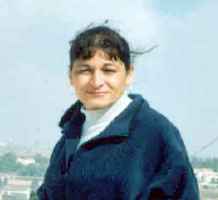 Sonia Nimr, Palestinian lecturer at Bir Zeit university, helped with the book Ignoring this and misrepresenting the text itself, Ms. Simon purblindly berates Elizabeth Laird: What is incomprehensible to me is that there is not even one mildly positive portrait of an Israeli in the entire book. Phyllis Simon's states that when she learned that A Little Piece of Ground [was] written by Elizabeth Laird in conjunction with a Palestinian writer, alarm bells sounded in my head almost immediately How reflexive is Ms. Simon's fear and hostility to anyone Palestinian! My comments do not serve as a review of Elizabeth Laird's âA Little Piece of Groundâ. It is simply a brief response to Phyllis Simon's effort to justify her (now unsuccessful) endeavor to suppress publication and distribution of this book. I commend the book to you for review. Purchase it, read it, and consider whether there are children in their early teens with whom you in turn would wish to share it. Children in their early teens soon will assume adult responsibilities for our world. The passions, conflicts and injustices of today will not magically dissolve before their adulthood. They too will need to grapple with these dilemmas. What can help them understand the possible paths to peace and justice in a world they will inherit with the billions of other soon-to-be adults in other countries? Surely not silencing a Palestinian, or any other, child's story.
Book Review: A Little Piece of GroundHarvey Thompson, World Socialist Web Site A Little Piece of Ground (2003) by Elizabeth Laird, Macmillan Childrenâs Books (ISBN 0 330 43679 1) A Little Piece of Ground by Elizabeth Laird is the story of 12-year-old Karim Aboudi and his family who live in Ramallah, on the West Bank. Karim desperately tries to play football wherever he can, while coping with his love-sick older brother and annoying younger sisters. Israeli tanks have badly damaged the local school and playing fields, as well as areas throughout Ramallah. As a result, Karim has precious little space to play. And there is so little time to play, or buy groceries for the family, as everyone in the town dodges the Israeli curfews as best they can. The typical Palestinian family is trapped in an apartment for days and weeks at a time, without being able to step outside for a breath of fresh air from fear of a sniperâs bullet. The book takes the reader on a journey into Ramallah during moments when the city is free to breathe before residents are once again locked down. At a checkpoint, on the way to the village where the familyâs relatives live, Karimâs father is forced out of the car and made to strip at gunpoint. In the young boyâs eyes, his father is humiliated along with a long line of Palestinian males. Later at the farm, the family attempt to harvest olives amongst groves that have belonged to the Aboudi family for generations, but they are shot at by Israeli settlers. Originally from New Zealand, Laird began traveling as soon as she finished her education. She lived and worked (as an English teacher) first in Malaysia, then in Ethiopia. Later she taught at a summer school in India, and then went to live in Iraq, where she got a job as a violinist in the Iraqi Symphony Orchestra and where her husband, David McDowall, was working for the British Council. They moved on to Beirut (during the Civil War), and were evacuated to Vienna. They settled in England with their two sons in 1979, and both began to write. Laird has lived and worked in England ever since, though she makes frequent visits abroad, especially to Ethiopia, where she has set many of her stories and with which she professes a close affinity. Within days of A Little Piece of Ground being launched at the Edinburgh Book Festival in August last year, the publishers had three demands for it to be withdrawn. A number of Jewish pressure groups, mainly centred in North America called for the book to be pulped. Phyllis Simon, the co-owner of the Canadian childrenâs bookshop Kidsbooks, made the first complaint to the publisher, describing the book as a âblatant piece of hate-fomenting propagandaâ. Linda Silver, of Jewish Book World said Lairdâs book portrayed Israelis as âmindless killing machinesâ. Laird denied accusations that the book was anti-Israeli or biased; âI did expect comeback, but to say that any criticism of Israel is anti-Semitic is doing Israel a disservice. This is an important story that should be told. It shows a child under military occupation. Itâs terrible for the occupiers, and terrible for the occupied. I hope I have shown how awful it is for the soldiers too.â Against accusations of one-sidedness, Laird cited the response to an earlier book, Kiss the Dust, âabout a Kurdish family who escape from Iraqi Kurdistan and are interned in an Iranian refugee camp under very harsh conditions. Nobody has ever said to me that I should have shown the point of view of the Iranian guards in that camp. I would very much have liked to have put in that story a sympathetic Israeli character and, indeed, I tried to see how that could be done. But thereâs no point in making a sentimental attempt to show a half-truth when the whole truth is there in front of me.â There have been many voices of support for the book, including the current Childrenâs Laureate Michael Morpurgo. He urged parents to encourage their 11 to 14-year-olds to read the book. âRead it, and we know what it is to feel oppressed, to feel fear every day. And we should know it, and our children should know it, for this is how much of the world livesâ he said. 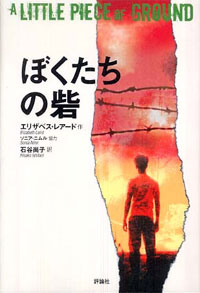 Japanese edition of A Piece of Ground The book was released to publishers worldwide at last yearâs Frankfurt Book Fair, although problems were encountered in gaining access to the US/Canadian market, which has usually welcomed Lairdâs previous books. Lairdâs collaborator on A Little Piece of Ground was Dr Sonia Nimr, a Palestinian university lecturer who teaches at Bir Zeit University and lives in Ramallah with her young son. The book captures well the tense, claustrophobic atmosphere within Ramallah and makes an effective use of Karimâs growing youthful energyâjust to stretch his legsâas a metaphor for the inhuman conditions being suffered by the populace who inhabit some of the most cramped conditions anywhere on earth. The story tries to explore the contradiction of a young boy striving for a childhood (in the form of football), but faced with the crushing reality of conflict. Laird also explores some of the class difference amongst the Palestinian population. Karim comes from a family of means (even if modest) and his mother always tells him to avoid the children from the poorer side of town, so when he meets Hopper, a child from the refugee camp whose brother is languishing in an Israeli jail; it is something of a shock. Karimâs sudden burst of anger at the checkpoint is momentarily powerful, but is not followed throughâbecoming a wasted opportunity to take the reader further into some of the anxieties, fears and hopes of so many Palestinian youngsters. Karim later tells his family: âWe should be like the bombers and kill as many as we can.â But we never find out what his family feel about this, nor Karim for that matter. This chance again resurfaces when Karim sees his brother throwing stones at the Israeli tanks and he is wounded, but once again nothing deeper is retrieved from the situation. Also unconvincing is Karimâs interaction with his older brother and conversations amongst the adults, which while at times fluid and realistic, almost always slips into sound bites. Despite its weaknesses, however, the fact that A Little Piece of Ground was published in the face of considerable opposition and has gained an appreciative audience is a significant event and will hopefully spur on other writers to chronicle the lives of children living in similarly difficult conditions around the world.
Intense Campaign Under Way To Ban Novel Describing The Life Of A Palestinian Boy Under Israeli OccupationCanadian Arab Justice Committee Press Release 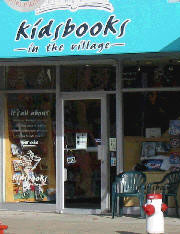 Kidsbooks owner behind campaign to ban respected children's author Elizabeth Laird's, A Piece of Ground
Ms. Simon has every right to refuse to sell the book in Kidsbooks, but to cajole other bookstores to do likewise and to pressure MacMillan U.K. to "pulp" it is censorship and a blatant attack on free speech.
Phyllis Simon, co-owner of Kidsbooks in Vancouver, has initiated a nation-wide campaign to ban highly respected children's author Elizabeth Laird's, A Little Piece of Ground. Described as "a fine book, a daring book" by renowned children's book reviewer Michael Morpurgo, A Little Piece of Ground provides a perspective of Israel's illegal military occupation of the West Bank through the eyes of Karim Aboudi, a 12-year-old boy living in Ramallah. Early in the 200-page novel written for 11 to 13-year-olds, Karim watches his father being humiliated at an Israeli checkpoint. "Almost naked, stripped of everything, he was trying to stand upright, to hold up his head and show, in his face at least, the dignity which had been taken from him." "I hate them. I hate them. I hate them," the chapter ends. Aside from describing Karim's life under military occupation, A Little Piece of Ground tells of his yearning for a "little piece of ground" to serve as a soccer pitch that is safe from Israeli soldiers. Karim also dreams of liberating his people from occupation and, after witnessing Jewish settlers confiscate his family's olive grove, he imagines himself inventing an acid that dissolves the steel of Israeli tanks. As the story goes on, Karim and his friends find a place to play soccer, become swept up with the excitement of the Intifadah and make a fake bomb. As well as urging other bookstores not to stock A Little Piece of Ground, in a posting on a Website called Hasafran, a forum of the Association of Jewish Libraries, Ms. Simon urges publisher MacMillan U.K. to reconsider the "damaging book's" release. "I am left with a profound sense of shock and disgust at the irresponsible decision to publish what I feel is a racist, inflammatory and totally one-sided piece of propaganda at a time when efforts are being made to resolve this conflict." (Toronto Star, August 28, 2003.) Born in New Zealand, Ms. Laird has lived in the Middle East and wrote A Little Piece of Ground in collaboration with Palestinian writer Sonia Nimr. One of her previous books, Kiss the Dust, a story of conflict between Kurds and Arabs in Iraq, won the Children's Book Award and is readily available in bookstores, including Kidsbooks.
As far as pro-Israel advocates are concerned, by writing A Little Piece of Ground, Elizabeth Laird has committed the sin of providing a glimpse of the misery and suffering Palestinian children and their families have endured for 36 years under an undeniably brutal Israeli military occupation.
Ms. Laird knew her story about the life of a child under Israeli occupation (drawn from actual events documented by an Israeli human rights group) would cause considerable controversy. "I know that this is a very, very sensitive topic on which people feel very deeply ... Anybody who writes on this subject is not going to please everybody. And I knew that. That was a risk that I took." In response to Ms. Simon's accusation that A Little Piece of Ground is "totally one-sided," she told the Toronto Star that the work was not meant to tackle the entire spectrum of Israeli-Palestinian relations. The fact that there are no sympathetic Israeli characters is a reflection of the reality in a place like Ramallah where the book is set. Regarding her lack of reference to the traumatic effects of suicide bombers on Israeli children, she observed: "If anybody would like to write a book about the effects of suicide bombing on Israeli children, or what it's like for an Israeli child, I would very much welcome that. I think that would be an excellent thing to do. Because I think that all aspects of this truth should be understood." The concerted effort by Phyliss Simon and others to prevent A Little Piece of Ground from being read by Canadian adolescents cannot be tolerated. Ms. Simon has every right to refuse to sell the book in Kidsbooks, but to cajole other bookstores to do likewise and to pressure MacMillan U.K. to "pulp" it is censorship and a blatant attack on free speech. As far as pro-Israel advocates are concerned, by writing A Little Piece of Ground, Elizabeth Laird has committed the sin of providing a glimpse of the misery and suffering Palestinian children and their families have endured for 36 years under an undeniably brutal Israeli military occupation. In the interests of understanding the nature and causes of the conflict, young Canadians must not be denied the opportunity to read Ms. Laird's novel. Canadian Arab Justice Committee urges all Canadians to purchase a copy of A Little Piece of Ground and to encourage bookstores everywhere to stock it.
Upfront: Elizabeth LairdDavid Williams, New Zealander Listener DAVID WILLIAMS talks to New Zealand-born author Elizabeth Laird about her controversial new novel about Israel and the Palestinians. 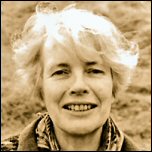 Elizabeth Laird
itâs quite proper and right that those who are now victims should have a voice..
Elizabeth Laird She doesnât look like a troublemaker. The dying afternoon sun catches her white hair and her simple white T-shirt. Her small frame is perched cross-legged, yoga-style, on the cane couch by the window. Considered and well-spoken, she is quick to smile and laugh, and her engaging way of speaking could charm a classroom in a second. Yet there is trouble, and New Zealand-born childrenâs author Elizabeth Laird is not backing away â even though one of her critics is a friend. Her latest novel follows a fictional 12-year-old Palestinian boy, Karim, in the West Bank town of Ramallah. His school is destroyed by tanks, the familyâs olive farm is taken over by settlers and his father is stripped and humiliated at a checkpoint â all at the hands of the Israelis. On the first page, the bookâs hero wishes he could invent an acid formula to dissolve the steel used by the Israeli tanks and helicopter gunships. Laird, who won the Childrenâs Book Award for Kiss the Dust, knew when she took the project on that she was inviting trouble. And it did not take long to surface. Within days of A Little Piece of Ground being launched at the Edinburgh Book Festival in August, publisher Macmillan had three demands for it to be withdrawn. One of its critics, who said the novel was âa very biased bookâ, is her friend and fellow author Ann Jungman, a member of lobby group Jews for Justice in Palestine.
Incredibly shocked at what she saw in Ramallah, Elizabeth Laird says the nightmare of real life was much worse than her novel.
The turmoil seems surreal in the relaxed setting of the 59-year-oldâs London home, which backs onto Richmond Park. But once Laird starts speaking about A Little Piece of Ground, a collaboration with Palestinian university lecturer Dr Sonia Nimr, you can hear the edge in her voice. She is unrepentant and will not accept that her book is biased against, or unfair to, Israelis. Incredibly shocked at what she saw in Ramallah, she says the nightmare of real life was much worse than her novel. She is sympathetic to Jewish people, but their cause is bolstered by a large body of childrenâs literature on the Holocaust. The story of the Palestinians is not well understood, she says, and âitâs quite proper and right that those who are now victims should have a voiceâ. Her detractors donât seem to pick up on Lairdâs sympathy. Jungman said that all the Palestinians are portrayed as reasonable, while the Israelis are monsters. It was not what was in the book she objected to â it was what had been left out, she said. Meanwhile, Phyllis Simon, the co-owner of Canadaâs largest childrenâs bookstore, Kidsbooks, said in a letter that she was left in âshock and disgustâ after reading the book and urged Macmillan to rethink its decision to publish it. âI feel [it] is a racist, inflammatory and totally one-sided piece of propaganda at a time when efforts are being made to resolve this conflict.â Laird concedes that it is impossible to give the Israeli side of the story when the novel is written through the eyes of a Palestinian boy. âHe has a particular view of the world. My obligation was to be truthful to that view. It would have been very nice to have put a sympathetic Israeli character in the story â maybe an Israeli child to be a friend or a kind soldier or something. But the truth is that sympathetic Israelis are not there in Ramallah.â She doesnât agree that all Israelis are portrayed as monsters. âI think that there are little insights that they are individuals as well in a situation which they havenât chosen. Theyâre not very big indications, but theyâre there if you look for them.â Another of her novels, Kiss the Dust, could be perceived to be biased, she says, taking the side of Kurdish refugees over Iranian camp guards. Nobody has asked her to redress the situation by showing the guards have problems of their own â âand they never willâ. In one of the most potentially controversial sections of the novel, Karim tells his family: âWe should be like the bombers and kill as many as we can.â I ask Laird if that was a dangerous concept to introduce to young minds. âIt would be, if it wasnât set in context of discussion with an uncle who says: âBut youâre wrong.â And I think when you read whatâs just happened to that boy, and how heâs just seen his father humiliated, youâll understand that thatâs how he feels at that moment. âIt would be actually rather irrational if he didnât feel like that, in a way.â Her next comments betray a little of her own feelings on the issue. Although stating that no Palestinian kids wanted to be suicide bombers, she says that they teased the Israelis, pretending to plant bombs and throwing aubergines at the tanks. âI loved that bit, didnât you?â she says about the aubergines, with a wide smile. âI think that was just so cool ⦠They bite off the green end, as if it was a pin coming out, and hurl it and of course people think itâs a grenade.â Would she go to Israel if someone invited her to see the other side of the story? âI donât know if I would, actually ⦠I donât think I can switch hats quite that easily. I feel that, having delved quite deeply into this aspect of the story, it would be kind of weird if I then went and wrote from the completely opposite point of view.â Macmillan is right behind Laird. Kate Wilson, the managing director of Macmillan Childrenâs Books, said they had thought through the implications of publishing such a book and had no intention of pulling it. She knew of no major chain of bookstores that had pulled it and said sales were âas expectedâ. The book is available in New Zealand. The storm is dying down in the UK, but controversy over the novel may yet be reignited if Macmillan finds a publisher in the United States. Laird says she is glad of the âbig pondâ between London and the US. The Middle East has been a family obsession, it seems. Laird spent her honeymoon in Baghdad with husband David, who then worked for the British Council and, later, for the United Nations. He is now a specialist writer for the Middle East and a Kurdish expert. He was in Ramallah on the day of our interview. Eldest son Angus, 26, is pursuing a career as a journalist in Tehran, while her youngest son, William, 24, is the odd one out in his career as a bio-logist. However, he is proudly following in the footsteps of his celebrated great-great-grandfather G M Thomson, a well-known New Zealand naturalist from Otago. Lairdâs own background is the stuff of books, really. Her father was the shipâs doctor on the SS Northumberland, which was off the coast of Napier during the 1931 earthquake. While on shore-leave in -Dunedin, he befriended a man in a bookshop â his wifeâs uncle. Her family returned to Britain in 1946. Laird doesnât have a writing project at the moment, despite having finished writing A Little Piece of Ground in April. However, she has another book, Paradise End, coming out soon. âSomebody does die in it, I have to say, but it is very different. Itâs about rich girl-poor girl meeting. Itâs a girlie book.â One can imagine that the interviews for a tapdancing yarn based in Britain will be a lot easier. Source: http://www.nzlistener.co.nz/issue/3309/features/856/elizabeth_laird.html This is the review that has been selectively quoted to bash Elizabeth Laird's book. Sadly the review says more about "Jews for Justice for Palestinians" (JfJfP) then it does about the book. Whilst JfJfP work well within the Jewish community highlighting the injustice perpetrated by Israel, their policy document falls short of justice. It does not refer to the Palestinian right of return, nor is there any condemnation of zionism as a racist ideology. Their website in fact categorically welcomes zionists as members. A Manichean WorldAnn Jungman, A Little Piece of Ground by Elizabeth Laird Macmillan Hardback £9.99 ISBN 0-330-43679-1 A Little Piece of Ground is a very good, book, conveying with great authenticity the frustrations, the claustrophobia and humiliations, which are a part of daily life in Occupied Palestine. The book tells the story of Karim, a twelve year Muslim Palestinian, who wants to be much like twelve years old boys everywhere else: tall and handsome, a brilliant football player and a world famous pop singer. Of course he is even less likely than most twelve year old boys to achieve those ambitions because of the ghastly conflict being acted out daily on the streets. It starts with the end of a long period of curfew; just as Karimâs family get ready to explode, the curfew is lifted, shopping can be done, friends can meet, essential medicines can be bought and a football can be kicked. Karim, exhilarated by being outside again, moves further from home than usual and makes a marvellous discovery â an empty piece of ground where he can play football and a new friend, Hopper from the huge refugee camp nearby. A Little Piece of Ground is the story of these two boys and their families and the resistance that they put up to the Israeli Army . The story is told entirely from the viewpoint of a twelve year old boy and as such it works brilliantly. We really feel with Karim and when the little piece of ground is finally taken over by Israeli tanks and the boys are deprived of yet another freedom, the resistance just goes on. The only hope seems to be the nobility and courage of continued opposition; no possibility of peace is ever posited. A whole world is built up in the this book, home and school, love and fear, town and country, refugees and locals, heat and sun and hopelessness. As a picture of a small country under siege it could not be bettered. Yes, as I read it I felt frustrated because I never picked up even a hint that the Israeli soldiers were human. One young soldier looked scared and another fed a cat but at no point is there any sense that the conflict is a shared tragedy. The Occupation was a terrible mistake and should end immediately but it has been a catastrophe for Israelis as well, eating into the moral, social and economic fabric of their society. Occupations always end up corrupting the occupier, as the Americans are discovering in Iraq. It canât be done humanely and well and the situation should be avoided whenever possible. But I never picked up from A Little Piece of Ground a flicker of such useful thoughts. Only rage and hate of a kind that is entirely understandable is represented and that seems to me to present a very hopeless and despairing scenario for the future. When I visited Palestine, Palestinians often said that the Occupation was destroying two countries; it is a good viewpoint and likely to push those who hold it towards a peace. Also, I found the Palestinian world portrayed here a very Manichean place. In the country on these pages there is no corrupt Palestinian Authority, no collaborators, no criminals and most oddly no fundamentalists, not even a mention of Hamas - just a group of victimised people, all of whom are virtuous. Of course this is not true. In every place at every time there is a big mix of people, some good, some bad, most a mixture of both. But in this book just as all the Palestinians are good, all the Israelis come across as inhuman robots. Yet, over a thousand young Israelis prefer to go to jail, rather than serve in the Occupied Territories, 100,000 Israelis attend Peace Rallies and some go regularly to Palestine to help with olive harvests, to stop wells being filled in, to try to prevent house demolitions and teachers, doctors and human rights activists from both sides consistently work together to my certain knowledge. The Israeli Peace Movement is not just the best hope for the region, it is the only hope, the only alternative to the destruction and exile of one of the protagonists. Now, a novel does not have to give a lesson in history or politics or present both sides of every conflict, but there is a convention in war novels and most particularly those for children that establishes in the course of the story the fundamental humanity of both sides. This seems to me an excellent tradition, not only because it gives a gleam of hope in a naughty world , but mainly because it is always, always, true.. Had A Little Piece of Ground managed to incorporate even a hint of the above, I think it would have turned a very good book into a brilliant one. . (Ann Jungman is a member of Jews for Justice for Palestinians and works to build bridges and pull down walls between Israelis and Palestinians).
Additional Material
Also Of InterestPage URL: http://www.inminds.co.uk/article.php?id=10081
|
|
Support Us
If you agree with our work then please support us.Campaigns INMINDS Facebook Live Feed Latest Video's
INMINDS Twitter Feed Tweets by @InmindsComFeatured Video's
You need Flash player 8+ and JavaScript enabled to view this video.
[all videos (over 200)..] Featured MP3 Podcast 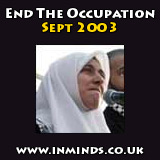 "What should I do when my daughter, just 20 months old, calls for her father? Am I supposed to tell her that the people who killed her father were never brought to justice and were probably awarded military honours for their performance during war? .. I will raise her never to forgive or forget. Never to forget her father and never to forgive those who killed him." wife of al-Jazeera journalist Tareq Ayyoub, murdered by US troops End the Occupation rally Sept 2003 [9min / 8Mb] [all podcasts..] Newsletter Feedback |
 |
 |

























